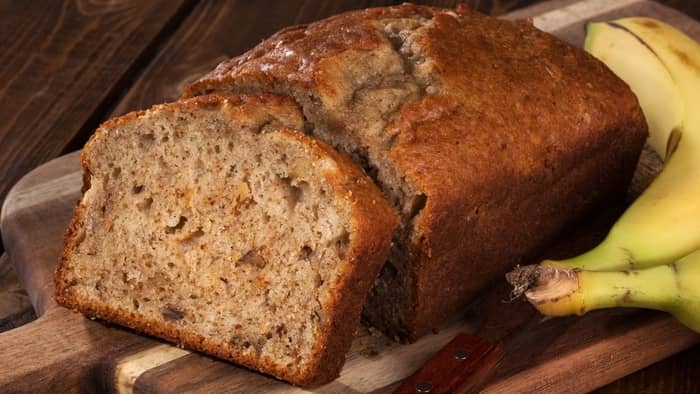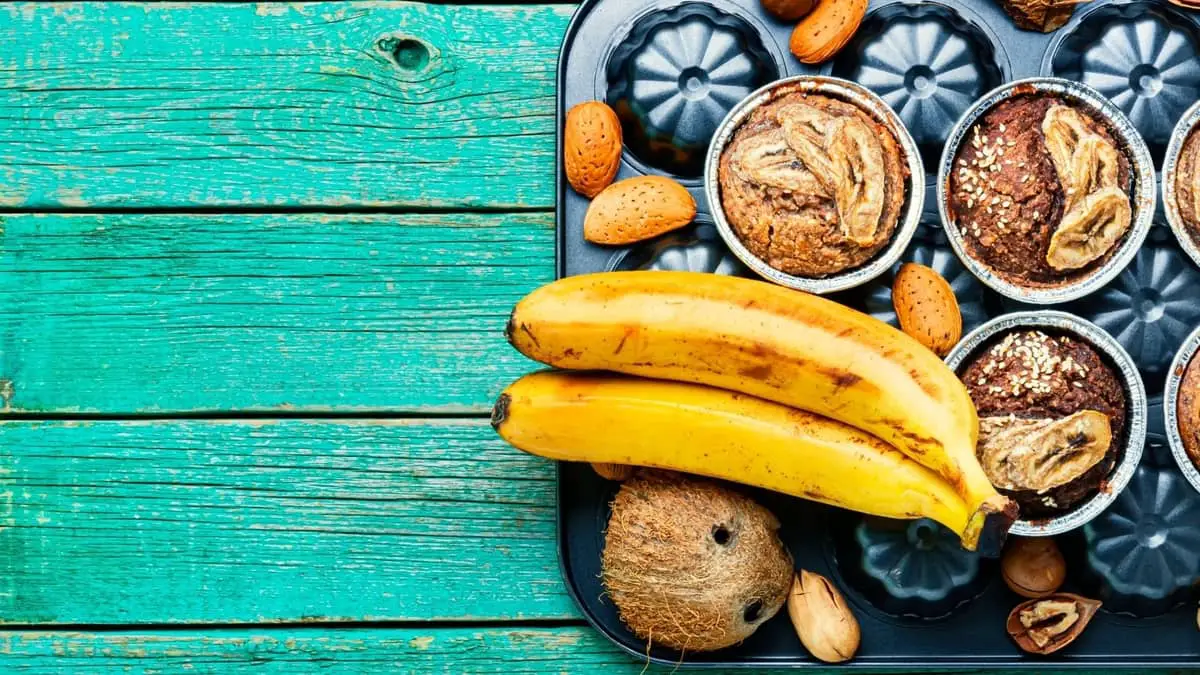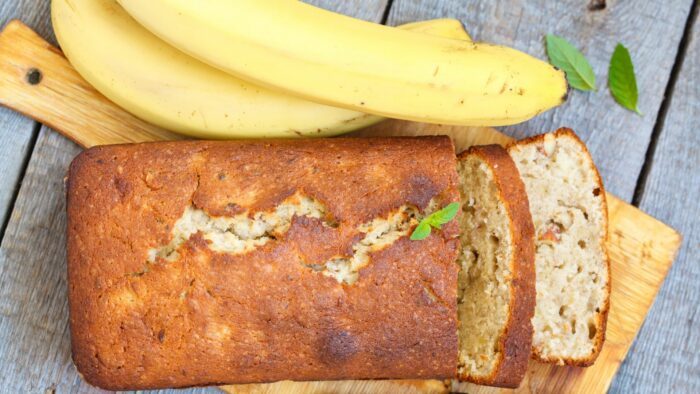Last Updated on March 20, 2023
Are you looking for a substitute for banana in baking? Well, we’ve got you covered! From plantain to the egg; our comprehensive guide has it all!
Bananas are delicious ingredients that add a ton of delicious juicy flavors and textures to any baked product. But sometimes it isn’t possible to use them. For this reason, we have made an in-depth guide on the many substitutes you can use when to use them, and even how to use them best.
Functions of Banana in Baking
Believe it or not, bananas do actually have a function when used in baked goods.
Yes, the most obvious effect it has is adding that delicious tropical banana flavor. Bananas generally have quite strong flavors, so no matter how or where you use them, you will most likely taste them.
Take our Moist Banana Bread for example. Even though we use a cake mix (which usually has overpowering flavors of its own), you still pick up strong banana flavors.
Then, bananas also have strong binding characteristics. This is thanks to the fibers they contain. When a ripe banana is mashed, it helps bind the wet and dry ingredients together.
Simultaneously, it also adds moisture! This is why recipes almost always call for ripe bananas – because they have more moisture.
Bananas also help add texture to recipes. You can use them mashed, sliced, chopped, or pureed. The form you use will have a direct effect on the texture of the recipe. When used mashed or pureed, it naturally makes the product softer (because of the moisture it adds). Bananas can potentially cause dense products, but not dense like fruitcakes. Denser like, well, banana bread.
Unfortunately, not everybody loves bananas. Or, sometimes, you may not have the amount of the type of banana the recipe calls for. Some people even have allergies. Regardless of what your reason is for wanting to substitute them, we have got you covered!

Choosing a Substitute for Banana in Baking
So, now that we have covered the functions of bananas, let’s look at a substitute for bananas in baking.
The most important factor to consider is what you want to substitute in terms of function. If for example, you need to substitute the banana flavor, you would choose something that has a banana flavor.
But, if you need to substitute the moisture (and the flavor doesn’t really matter), you will choose a wet ingredient.
And similarly, if you want to substitute the texture that banana adds. You will choose a substitute that is similar in texture. So water, for example, won’t work because it is way too runny and will make the texture potentially mushy.
The best way to decide on which substitute you need to use is to experiment. You can to a certain extent use logic, but baking is chemistry and sometimes what you think will work simply doesn’t.
What Can I Use Instead of a Banana?
Our guide helps take the thinking out of substituting! And, we have included a wide range of substitutes so that you are guaranteed to find something that works for you.
Plantains
Plantains, also generally referred to as cooking bananas, are a type of banana species, but they aren’t bananas. They are by far the best banana replacement you can use.
Plantains have virtually the exact same texture and flavor as bananas. They are less sweet, but the banana flavor is still there. You can buy them in an unripe form (when they are completely green and hard) or their ripe form (when they are pitch black and very soft).
Plantains are much bigger than bananas – this is what mostly makes them different.
Now, unfortunately, they are a bit difficult to find depending on where you are in the world. But, we are sure with a bit of research you can find some in your area.
How to Use Plantains
When used correctly, plantains will match the flavor, texture, moistness, and binding abilities that bananas have.
Because they are much larger compared to bananas, you will have to substitute them using grams. For example, if a recipe calls for one banana, it usually weighs about 116 grams. So, when using plantain as a substitute, weigh out to 116 grams as well. You can also work in cups, but measuring by weight in baking is always more accurate.
You also have to cook plantains. They are inedible when raw – or at the very least extremely unpleasant.
When using plantains for baked recipes, you will almost always have to buy ripe plantains. But luckily, these are much easier to find compared to unripe plantains.
Applesauce
Applesauce is also a great substitute for bananas in baking. You can use either store-bought or homemade applesauce for this substitute. As long as it has a nice thick consistency.
But unfortunately, applesauce does have some downsides. First, it doesn’t have a banana flavor. And, you can only substitute 2 bananas. Otherwise, the sauce will make the mixture too runny.
However, both of these problems can be fixed. To add banana flavor, you can add some essence or extract. And, to make the mixture less runny (if you substituted more than 2 bananas) you can add more dry ingredients like flour.
How to use applesauce
To use applesauce as a substitute, replace every banana with 1/2 cup of applesauce. It will help add moistness to the baked item and help bind the ingredients together.
Eggs
Yes, just like bananas work as a substitute for eggs, eggs can also work as a substitute for bananas. And, it is extremely easy! For every banana that you need to substitute, you can use one large egg.
The only thing to take into consideration is that eggs don’t have a banana-like flavor and if you use too much, it can make your product dense and rubbery. We would recommend only using 2 eggs at most.
Canned Pumpkin
Now, this might sound very strange and far-fetched, but canned pumpkin actually has virtually the same consistency as a pureed banana.
The biggest downfall is the pumpkin flavor. But, this allows you to make a pumpkin cake (or muffin or bread) instead of a banana-flavored one. Unfortunately, pumpkin also has an extremely strong flavor and no amount of banana extract can change that.
Mashed Sweet Potato/Potato
Very much like the pumpkin substitute, cooked and mashed sweet potato or regular potatoes have very similar textures and binding abilities to bananas. And, they aren’t as pungent as pumpkin puree. This allows you to try and incorporate some banana flavors using extract.
Can You Substitute Banana For Milk?
Bananas are fantastic nutritious substitutes for dairy products; however, it depends entirely on the consistency you are using.
Milk will help add moistness to the baked goodies. However, it will also make the mixture runnier. So, you should avoid using too much. You can counter the runny texture by adding more flour.
Substitute for Mashed Banana in Baking
There are many substitutes for mashed banana in baking. Some of my favorites include:
- plantain. A larger, less sweet banana alternative. While the flavors of the two are very different, plantains are much creamier.
- applesauce. Adds moister and flavor. 1/2 cup of applesauce for one medium banana.
- sweet potato. All you need to do is cook and mash them, and use them as a 1:1 replacement for mashed bananas.
- oatmeal. While the flavor and texture are very different from bananas, oatmeal works as a great thickener instead of mashed bananas.
- Greek yogurt. Another option works best as a thickener. It also makes any dish creamy and thick.
- coconut cream. Coconut cream is a perfect option in place of mashed bananas. However, it’s important to remember that coconut cream is very high in fat, in comparison to bananas.
Substitute for Plantains
If you’re looking for something to replace plantain in a recipe, then look no further. Bananas are the best substitute. However, you should use bananas that aren’t yet ripe for the best results. Other great substitutes include mashed sweet potato or breadfruit. Be sure to cook the sweet potato before mashing it.
What’s in a Banana?
Bananas are best known for being packed full of potassium, but the truth is they are filled with a whole host of vitamins and minerals. The average-sized banana is 7 inches in length and is full of the following goodness:
- potassium: 451mg
- magnesium: 34mg
- calcium: 6mg
- iron: 0.3mg
- zinc: 0.2mg
- niacin: 0.8mg
- vitamin e: 0.1mg
- vitamin b6: 0.5mg
- vitamin a: 4mcg
- vitamin c: 11mg
Nutritional Information in a Banana
You may be wondering what the nutritional value is when it comes to bananas. A medium-sized banana contains the following nutrition:
- calories: 110
- fat: 0g
- protein: 1g
- carbohydrates: 28g
- sugar: 15g
- fiber: 3g
- potassium: 450mg
Health Benefits of Banana
There are many benefits when it comes to introducing bananas into your diet. One of the most obvious reasons is the fact that it’s full of nutritional goodness, in the shape of vitamins and minerals. But as well as that, it’s full of other health benefits. Let’s take a closer look at them.
-
- Can Help Regulate Blood Sugar Levels. The fiber that’s found in bananas is the best kind, as it helps to regulate your blood sugar levels after eating.
- Aid Digestion. As bananas are full of fiber, they are great for your digestion. If you’re looking for a way to aid constipation, try eating a simple banana as this will help massively.
- Help Heart Health. The main goodness in bananas comes from potassium and this helps you to have a healthy heart and healthy blood pressure.
- Feel Fuller for Longer. As bananas are good for digestion and full of fiber, this also means that you’ll feel fuller for longer, without the additional calories.
- Easy to Introduce Into Everyday Life. Whether it’s as a snack on its own, topped in your yogurt or granola, paired with toast, or used in desserts – bananas can be used for almost any aspect of baking and cooking. As well as this, they’re reasonably inexpensive and easily accessible.
Final Words
As you can see, there is no shortage of substitutes for banana in baking. You can choose something as simple as an egg, or more complex like applesauce. Regardless of which you choose, always experiment and make notes on the changes you’ve made. Let us know if you found this article useful or if you have any questions.

Lindy Van Schalkwyk is a culinary specialist with a background in Advanced Cooking, Advanced Pâtisserie, Media Communications and Nutrition. She has gained invaluable experience in the culinary industry having worked in some of the top restaurants in Africa in 2016 and 2017. Her expertise in nutrition has enabled her to develop recipes for special dietary needs. In 2018, Lindy began working in the Food Media industry, focusing on recipe development, recipe writing, food writing and food styling.



